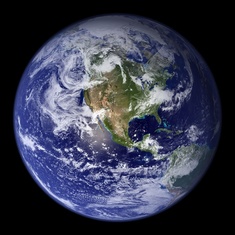
The Earth's Ever-Slowing Rotation and What It Will Bring Us
First published: Saturday August 7th, 2021
Report this blog
Introduction
Ever since the beginning of the human civilization, we have organized our lives according to the rotation of the Earth, namely the day-night cycle. The human race has even developed a wide variety of timekeeping tools throughout its history in order to facilitate this organization. But not everyone knows that the Earth's rotation is getting slower as a result of tidal friction.
Why It Happens
The Earth's rotation is getting slower over time for the reason that the Moon exerts a tidal force on Earth, taking angular momentum away from it. This slows Earth down and increases the distance between the Moon and the Earth.
How Quickly Is Earth Slowing Down?
If you are worried about the slowing of Earth's rotation after reading the section above, stop worrying about it because this rate of change is very small. Compared to exactly one year ago today, it takes Earth 14 extra microseconds (1.4 × 10-5 seconds) to complete one full rotation. Assuming that the Earth's period of rotation was exactly 86,400 seconds in the year 1900 and there is a linear relationship between the year count and the length of a day, the length of an Earth day in any year can be estimated using the formula L=86400+(Y-1900)*0.000014, where L is the time it takes Earth to complete one full rotation (in seconds) and Y is the year count in the Gregorian calendar. Note however that this can only provide a very rough estimate, because the exact length of a day is affected by many other factors, such as glacial melt, wind, and storms. But these factors can be ignored in the long term.
Using this formula, we can carry out estimates of the length of an Earth day in prehistoric times:
- When the dinosaurs became extinct (about 65 million years ago), the length of a day was about 85,490 seconds (about 23.75 hours);
- When the dinosaurs emerged (about 300 million years ago), the length of a day was about 82,200 seconds (about 22.83 hours);
- When the Earth was formed (about 4.5 billion years ago), the length of a day was only about 23,400 seconds (6.5 hours).
The Negative Impacts
The gradual slowing of Earth's rotation brings us many negative consequences. For example:
- You will have to be awake for a longer period of time before you can go to sleep again.
- You will have to work or study longer a day.
- We will have to modify our clocks (which we are already doing by inserting leap seconds periodically) and eventually change the rules of our calendar.
- Fewer days make up a year and (as a result) a season, which means you will have to change your clothes more often.
The Positive Effects
The fact that Earth is slowing down is not necessarily bad depending on how you see it. The positive effects this can have include:
- You will have more accomplished each day.
- You will have more free time during the weekend.
Conclusion
The slowing down of Earth's rotation is nothing strange as everything in our universe changes. When a change occurs, we have to adapt to it in some way, which in this case can be modifying our clocks and our calendar. The question now becomes how we can make these changes, which is beyond the topic of this blog (but may be included in a future blog).

I've heard about this concept, but it's very helpful to reach into it more :)